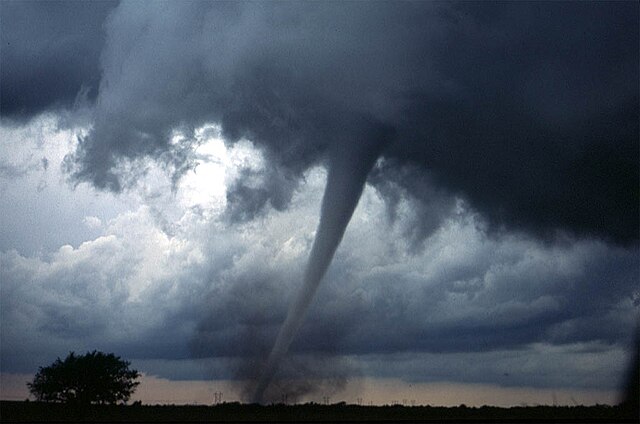
Extreme weather
Unusual, severe or unseasonal weather / From Wikipedia, the free encyclopedia
Dear Wikiwand AI, let's keep it short by simply answering these key questions:
Can you list the top facts and stats about Extreme weather?
Summarize this article for a 10 year old
Extreme weather includes unexpected, unusual, severe, or unseasonal weather; weather at the extremes of the historical distribution—the range that has been seen in the past.[1][2] Extreme events are based on a location's recorded weather history. They are defined as lying in the most unusual ten percent (10th or 90th percentile of a probability density function).[2] The main types of extreme weather include heat waves, cold waves and heavy precipitation or storm events, such as tropical cyclones. The effects of extreme weather events are economic costs, loss of human lives, droughts, floods, landslides. Severe weather is a particular type of extreme weather which poses risks to life and property.

Weather patterns can experience some variation, and so extreme weather can be attributed, at least in part, to the natural climate variability that exists on Earth. For example, the El Niño-Southern Oscillation (ENSO) or the North Atlantic Oscillation (NAO) are climate phenomena that impact weather patterns worldwide.[3] Generally speaking, one event in extreme weather cannot be attributed to any one single cause. However, certain system wide changes to global weather systems can lead to increased frequency or intensity of extreme weather events.[4]
Climate change is making some extreme weather events more frequent and more intense.[5]: 1517 This applies in particular to heat waves and cold waves. The science of extreme event attribution looks at the reasons behind extreme events. Scientists are fairly sure that climate change makes heavy rainfall events as well as drought periods more severe.[6] Climate models indicate that rising temperatures will make extreme weather events worse worldwide.
Extreme weather has serious impacts on human society and on ecosystems. There is loss of human lives, damage to infrastructure and ecosystem destruction. For example, a global insurer Munich Re estimates that natural disasters cause more than $90 in billion global direct losses in 2015.[4] Some human activities can exacerbate the effects, for example poor urban planning, wetland destruction, and building homes along floodplains.